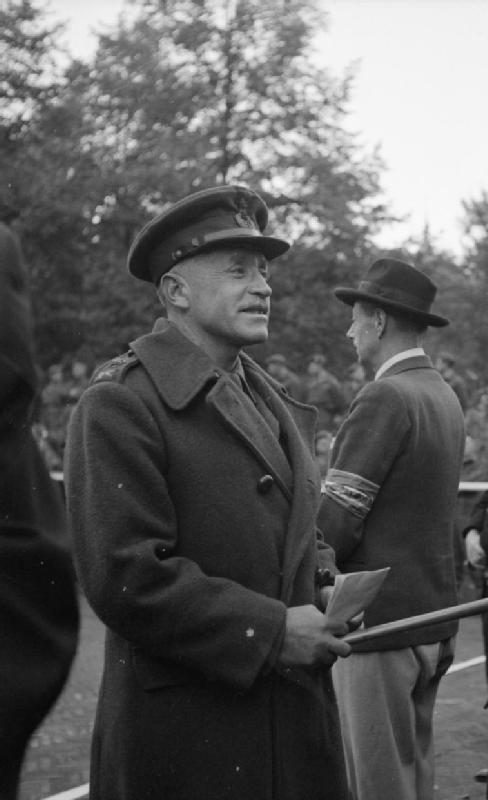General Sir Richard O’Connor.
MAJOR GENERAL RICHARD O’CONNOR
Commander Western Desert Force
We started out to do a five-day raid. My resources were only two divisions, the 4th Indian and the 7th Armoured divisions, whose morale was extremely high and they were very well trained. The enemy, on the other hand, had a vast numerical superiority, something in the nature of eight to one, but their morale was low and they had no interest or enthusiasm for the war at all. We therefore felt that we had to do something to knock him off balance and prevent him using that vast superiority against our small numbers. In this we were helped because his method of defence was this: he had a series of these fortified perimeter camps and we decided that we would attack one and one only. As they were so far apart we felt sure they would be unable to support each other and we would be able to deal with this one by itself. Therefore, in order to get a better result, we decided that by night we would move our main forces round between two of these camps until we came right to the rear and then to attack from the rear, which would be the last place he would expect to be attacked, and then the surprise would be complete.
BRIGADIER HARDING
General O’Connor’s instructions were to inflict such heavy losses on the Italians to destroy their potential for the invasion of the Delta, and his tactics were to get in behind the camps in which the Italian forces had entrenched themselves and to take full advantage of their fortress-minded deployment and to knock off the camps one by one, at the same time inflicting very heavy losses on them. Eventually this opened the way to an advance which again he exploited to the full. He was a commander who was always looking for an opportunity for bigger and better things and he certainly saw this, appreciated it immediately and took advantage of it.
LIEUTENANT COLONEL BELCHEM
Although they greatly outnumbered us numerically and in other respects, our equipment was probably superior. Secondly their, training was very elementary: they were not trained for desert operations, the Italians, neither were they clever at night. Most importantly their morale, although apparently high, was a synthetic morale inspired by repetitive propaganda and one was very conscious that if they suffered a defeat this would probably peel off like a plastic wrapper, which in fact was the case. But they had, for example, no tanks worth paying much attention to and I speak with feeling for the Italian crews because I was myself with an Italian tank regiment in Italy for a period before the war. O’Connor undertook an operation that was due to last about four days, which was the limit for the available tanks, which were nearly worn out, and for our administration in terms of supplying water and fuel and ammunition. He achieved complete surprise, got behind the Italian positions at Sidi Barrani by a night march and in the morning Italian resistance collapsed. O’Connor’s great achievement was that by using captured vehicles and captured dumps of water and supplies he was able to maintain this four-day battle into an offensive lasting over a period of weeks and resulted in taking him as far as Benghazi and indeed beyond to El Agheila.
LIEUTENANT PAOLO COLACICCHI
Italian Tenth Army
Your army in Egypt, although considerably smaller than ours in number, was certainly better trained, better equipped especially in transport and tanks and armoured cars, and also had at the top generals who were certainly more aggressively minded than ours, so of course morale sagged even more. The armoured car acting as an OP [Observation Post] for the artillery had a tremendous effect on our men because they couldn’t see the enemy. We could just see something glistening on the horizon, which was the armoured car, and then you’d fire a few shots and it would move a couple of hundred yards and readjust the fire of your batteries and this shook very much our Libyan troops. We had two divisions of Libyan troops who had, some of them, fought very well in Ethiopia, but these men must see the enemy to fight well. You can’t put them in a fort and say hold it, and all day keep them subject to artillery fire, which they can’t see where it comes from. They turn to their white officer and say, ‘What about it, why can’t we fire back?’ And you say, ‘Well, we haven’t got the guns,’ and they say, ‘Well, then, they’re stronger and this is very bad.’
MAJOR GENERAL O’CONNOR
I wasn’t really surprised. I thought we’d do it, I thought we’d surprise them. We dominated no man’s land and so they really didn’t get their patrols out in the way they ought to have. The relative difficulty was getting right this night march between the two camps, which were only twenty to twenty-five miles apart. But they didn’t hear us: we had aeroplanes in the air to make a noise all the time so they never heard our movement and it came as a complete and absolute surprise to them.
